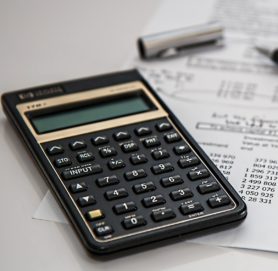Every now and then when a business is just in it’s preliminary stages and has just started operations, all financial and bookkeeping obligatory tasks fall head-on on the owner’s shoulders.
Once the business operations commence in full flight, it becomes a daunting chore to sustain that arrangement once the money starts to flow in and out of the business.
To take your business, start-up or side-hustle to the next level you need more than passion. You need a trustworthy team of people who are just as driven about your business as you are. If there is one task that needs to be delegated to a dedicated expert, then it has to be accounting.
Accounting errors can cost you.
When you’re trying to handle every aspect of the business yourself, details can get overlooked, especially as your business grows and your finances get more complex.
Many business and start-up owners do not know what an accountant can do for their business, so they end up not getting the most from their accountant or even hiring one.
One thing you should know is, there are bad accountants but a good one will help you run your business with clarity and confidence.
That is why hiring the right accountant is one of the most important decisions you can make as an entrepreneur. Young entrepreneurs often limit their accountant’s role to creating and submitting their accounts and tax returns.
Nevertheless, the right accountant will provide you with a wide variety of value-added services that will help you comply with up-to-date regulation, save money, reduce risk, manage growth and plan ahead.
As a business owner, all of your essential decisions will be reliant on your finances, so it is imperative that you have an excellent accountant that will not only give you the required information but advise you as well.
So, how can a good accountant help your business? Here are a few things they can do for your business.
- Set up an Accounting System
An accountant can help set up policies and procedures for your business. All accounting systems run on policies and procedures. Your accountant will help to automate your accounting by setting your business up on an accounting software, which will assist you capture sales and expenses into your accounts.
Accounting softwares have in built invoicing systems that tell you what has been paid and what has not. Some of these softwares will even send reminder emails to clients/customers who have not paid up on invoices.
There are tons of other automated systems which can assist with:
- automating accounts payable -; so you are always on top of expenses.
- generating cash flow dashboards, so you always see where your finances stand at any particular time.
- track key performance indicators (KPI), so you can check overall business performance 24/7.
- give you mobile accounting apps that allow you to manage your finances on the go.
2. To help you reduce your workload
Once your business takes off, you’ll need all your time to run day-to-day operations, rather than be occupied with tax compliance or bookkeeping.
In the same way, as the business finances become more complex, you’ll almost undoubtedly need an expert to take charge of them. Engaging an accountant will help you manage operations by recommending process improvements, take over the financial and tax obligations and introduce you to tools that can help you save time while also saving you money.
3. Budgeting
Detailed budgeting can eat up your time and energy. As a result, many businesses end up working off an ambiguous set of numbers full of assumptions and estimates.

Your accountant can help you produce a rigorous budget that gives you real assurance. You will understand the actual cost of doing business. You will discern how much money you can reinvest and what you can pay yourself.
4. Advise and Assist with Inventory Management
Smart inventory management is vital for doing good business. Spending a lot on storage or losing money writing off obsolete or damaged goods? Or do you sometimes lose revenue because you run out of stock?
Your accountant will find the cost of holding inventory and come up with strategies to save some of that money. Advantageously, they will review your sales data to help predict stock needs, so you can place accurate orders. They can even set up software that tracks stock levels and auto-orders items as they run low.
Good Accountants can do more than I have discussed in this post. Other functions they do carry include but not limited to:
- Taxes
- Payroll
- Improve internal controls
- Write loan applications
- Business strategy
So now, how do you find a good accountant?
Many business owners are not accountants, but they must hire an internal accountant or contract an external one.
Please do also note that I am a practicing accountant with over 7 years’ experience in diverse industries, a business and financial analyst and an excel tutor. I am available to help advise and assist in any way possible.
Entrepreneurship on its own can be complicated. No need to complicate your bookkeeping even more. I have got your back. Send me an email at maxwell@hedidor.com I have got your back. I will help manage your cash flow, manage your bills, track your expenses and much more.
Good accountants help you run your business better.
Tried my luck on QQ8822. Nothing groundbreaking, but it does what it says on the tin. Good if you’re just looking for something simple and straightforward, ya know?: qq8822
u91klg
ln40di
Buy an SMTP server for unlimited sending with guaranteed inbox delivery and high deliverability rates. We offer different types of SMTP servers to suit any of your sending needs. Our services include multiple server setup options with various pricing and configurations.
mmrfl5
4lrghe
r9mqu2
Create unlimited temporary email addresses for free with 0mail Pro. Enjoy fast, secure, and anonymous temp mail services – no registration required.
rds7p3
kwgzx2
5575iv